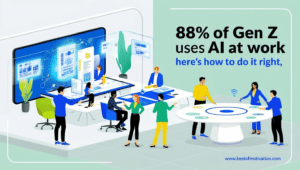📌 Article TL;DR
Swipe through this entire guide in under 60 seconds.
Millennials and Gen Z may sit next to each other in age, but their worldviews, tech habits, spending behavior, and work expectations are fundamentally different—and understanding these differences unlocks better marketing, leadership, and communication.
Businesses treat Millennials and Gen Z the same. But each generation responds to different messages, platforms, values, and experiences—leading to lost engagement and ineffective marketing.
Millennials value stability, convenience, and expressive online presence. Gen Z values independence, privacy, pragmatism, and authenticity. Their digital behavior, trust levels, and buying triggers are not the same.
Tailor your strategy: give Millennials clear value + relatable storytelling; give Gen Z short-form video, authenticity, influencer proof, and ethical brand alignment. Speak their languages, not a one-size-fits-all approach.
Master this dual-generation approach and you gain deeper reach, stronger loyalty, better conversions, and communication that actually resonates with each group.
They’re not just two age groups—they’re two different digital worlds. Understand them, and you instantly level up your marketing and leadership.
The divide between millennials and Gen Z is more than just a matter of years – it’s a chasm of experiences that have shaped vastly different worldviews. While millennials navigated the internet explosion, Gen Z has been immersed in an “always on” digital landscape since birth, a defining factor that permeates their tech habits and consumer behavior.
Distinct life events like 9/11, the Iraq War, and the 2008 recession profoundly influenced millennials’ values and attitudes, whereas Gen Z’s racial and ethnic diversity characterizes a more inclusive generation grappling with unique socio-political challenges. As we unveil these fundamental differences between millennials and Gen Z, businesses and marketers gain invaluable insights to connect with each cohort effectively.
Contrasting Values and Attitudes
Millennials and Gen Z exhibit distinct values and attitudes that shape their life choices and perspectives. Gen Z is more fiscally conservative, with 21% expressing concerns about the cost of education compared to 13% of millennials. While 34% of millennials prioritize stability, 32% of Gen Z emphasizes finding their dream job. Parental influence plays a stronger role for Gen Z, with 42% following their parents’ guidance versus 36% of millennials.
In contrast to millennials’ optimism, 77% of Gen Z expect to work harder than previous generations, reflecting a more pragmatic outlook. Gen Z values independence, with 71% believing in doing tasks themselves for optimal results, unlike millennials’ preference for collaborative arrangements. Moreover, Gen Z (70%) is more guarded about sharing personal information, even with their boss, compared to millennials’ openness on social media.
| Attribute | Millennials | Gen Z |
|---|---|---|
| Fiscal Outlook | Less conservative | More conservative |
| Career Priority | Stability (34%) | Dream Job (32%) |
| Parental Influence | 36% | 42% |
| Work Ethic Expectations | More optimistic | 77% expect to work harder |
| Work Preferences | Collaborative | Independent (71%) |
| Personal Information Sharing | Open on social media | Guarded, even with boss (70%) |
Gen Z’s distinct values and attitudes stem from their unique experiences, shaping a generation that is fiscally prudent, career-driven, and valuing independence and privacy.
Technology and Digital Habits
Millennials (born 1981-1996) and Gen Z (born 1997-2012) have grown up immersed in an ever-evolving digital landscape, with technology constantly at their fingertips. Both generations possess strong multi-tasking skills and an ability to compartmentalize, likely due to constant exposure to technology from a young age. However, this constant connectivity has also perpetuated impatience and reduced interpersonal skills in these cohorts.
| Key Difference | Millennials | Gen Z |
|---|---|---|
| Customer Service Expectations | Higher expectations, 80% expect immediate response | 64% expect immediate response |
| Switching After Bad Experience | 62% would switch to competitor | 45% would switch |
| Personalized Experiences | 63% willing to pay more for personalization | Believe personalization is not exclusive to luxury |
| Self-Service Preference | 40% experience exhaustion after customer service interactions | 30% find it frustrating when information is not available online |
| Privacy Concerns | 40% believe businesses protect their data | 48% believe businesses protect their data |
While millennials make up the largest share of users on 9 out of 11 digital platforms tracked, Gen Z will take the lead on platforms like Disney+, YouTube, Instagram, and X (formerly Twitter). Gen Z prefers more intimate communication platforms like ‘Finstagrams’ rather than public social media. Streaming video, music, social media, podcasts, and livestreamed games are major digital activities for Gen Z. Social media significantly impacts various aspects of Gen Z’s lives, including relationships, mental health, and purchasing decisions.
Consumer Behavior and Purchasing Decisions
Gen Z’s consumer behavior and purchasing decisions are shaped by their pragmatic mindset and mobile-first approach. They are twice as likely to make mobile online purchases compared to millennials, reflecting their seamless integration with digital channels. Gen Z prioritizes practicality and value, meticulously comparing prices and shopping for the best deal, unlike millennials who value convenience and customer experience.
| Key Difference | Millennials | Gen Z |
|---|---|---|
| Online Shopping Frequency | 74% buy products online more than once a month | Only 49% shop online more than once a month |
| Mobile Commerce | Less likely to make purchases via mobile | Twice as likely to make mobile online purchases |
| Brand Loyalty | More brand loyal | Less brand loyal, shop around for best deals |
| Purchase Drivers | Convenience, customer experience | Pragmatism, research options before buying |
Gen Z are pragmatic, informed consumers who extensively research options before making purchases. They place high importance on brand ethics and corporate social responsibility, and are less brand loyal, more likely to shop around for the best deal. As heavy users of social media and mobile channels, retailers must adopt an omnichannel strategy to effectively reach this cohort across multiple touchpoints.
Successful promotional tactics for targeting Gen Z include:
- Gamified loyalty program experiences
- Personalized offers and rewards tied to social media
- Collaborations with relevant micro-influencers
Brands like Nike and Duolingo have effectively engaged Gen Z consumers through consistent social media advertising, featuring diverse representation, aligning with their values and aspirations, and participating in trends on platforms like TikTok.
Marketing and Communication Strategies
Crafting effective marketing and communication strategies for millennials and Gen Z requires a nuanced understanding of their distinct preferences and behaviors. For millennials, focus on informative, entertaining content across social media, video, and podcasts that highlights how your product solves their problems or improves their daily lives. Leverage common interests like social media and instant gratification, while clearly explaining the practical value of your offerings. Millennials respond well to a wide range of promotional strategies, including social media marketing, reviews, and purpose-driven content. Incentivize them to spend more time on your socials by offering deals, discounts, and compelling reasons to follow.
On the other hand, Gen Z prefers short-form, mobile-optimized video content that quickly demonstrates the value of your product. Leverage influencers and niche social platforms like TikTok, Instagram, and Snapchat, where Gen Z engages more actively. Create genuine, authentic content that resonates with their values, engage the audience on social media, and showcase the practical benefits of your products. Gen Z responds better to ads and marketing featuring real people discussing products, rather than traditional advertising.
| Key Strategies | Millennials | Gen Z |
|---|---|---|
| Content Format | Informative and entertaining across social, video, podcasts | Informative, and entertaining across social, video, podcasts |
| Platforms | Social media, reviews, purpose-driven content | Influencers, niche platforms like TikTok, Instagram, Snapchat |
| Messaging | Highlight problem-solving, practical value | Authentic, value-driven, real people discussing products |
| Engagement | Deals, discounts, reasons to follow | Active social media engagement, influencer collaborations |
By tailoring their marketing and communication strategies to the unique preferences of millennials and Gen Z, businesses can effectively connect with these influential consumer segments, fostering brand loyalty and driving long-term success.
FAQs
1. What are the fundamental distinctions between Millennials and Generation Z?
The main distinction lies in their use of technology. Generation Z is more dependent on the internet and social media for making both purchasing and lifestyle decisions compared to Millennials.
2. How does Generation Z’s behavior and attitudes differ from those of Millennials?
Generation Z is characterized by a high degree of tolerance and inclusivity. They approach adulthood with a strong work ethic, aiming for success and feeling entitled to good job opportunities post-college, which contrasts with some attitudes seen in Millennials.
4. How do the consumer behaviors of Millennials differ from those of Generation Z?
Generation Z exhibits more conservative spending habits and places a higher emphasis on saving money compared to Millennials at the same age. They prefer purchases that offer maximum value, whereas Millennials tend to focus more on the overall buying experience.
3. In what ways does Generation Z’s approach to work differ from that of Millennials?
Generation Z is more career-focused and financially driven compared to Millennials, who generally prioritize a healthy work-life balance. Companies employing both groups should consider offering benefits that promote work-life balance alongside monetary incentives to cater to diverse needs.
Conclusion
The divergent experiences and mindsets of millennials and Gen Z have given rise to distinct values, behaviors, and preferences that profoundly impact their outlook on life, work, and consumption. As digital natives immersed in an ever-evolving technological landscape, these generational cohorts exhibit nuanced differences in their tech habits, customer service expectations, and approach to online privacy. Moreover, their contrasting attitudes towards fiscal matters, career aspirations, and work preferences shape vastly different pathways to success and fulfillment.
While millennials value collaboration, stability, and open self-expression, Gen Z prioritizes independence, pragmatism, and guarded privacy. Understanding these fundamental distinctions is crucial for businesses and marketers seeking to effectively engage and resonate with these influential consumer segments. By tailoring communication strategies, leveraging preferred platforms, and aligning with their distinct values and aspirations, brands can forge authentic connections, foster loyalty, and drive long-term success in an increasingly competitive and dynamic marketplace.











